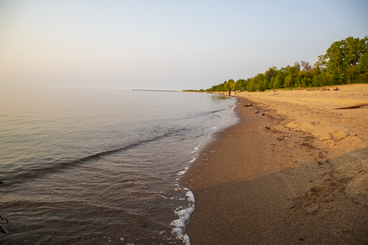
The following are strategies related to lakes, rivers, streams, and wetlands that are included in the Midwest Climate Adaptation Science Center's 2023-2026 Science Agenda.
- 1.2. Identify aquatic fish, wildlife, and ecosystems vulnerable to the impacts of climate on water quality and quantity.
- 1.5. Evaluate the efficacy of management strategies to limit negative effects of flooding, sedimentation, and contaminants on aquatic fish, wildlife, ecosystems, and cultural resources.
- 2.6. Assess the effects of lake ice loss on fish, wildlife, and ecosystems.
- 3.1. Evaluate fluctuations of water levels in stream, lake, and wetland ecosystems.
- 3.2. Determine the future geophysical conditions of inland lakes.
- 3.3. Determine groundwater contributions to stream refugia and potential impacts of climate-induced groundwater changes on ecosystems.
- 3.4. Determine the future condition and ecological function of prairie pothole wetlands.
- 3.5. Assess changes to aquatic connectivity and the subsequent effects on wetland/aquatic ecosystems.3.11. Assess the effects of climate change on current and anticipated aquatic pathogens, including transmission, ecosystem impacts, and management options.
- 3.6. Determine the climate-driven establishment, spread, impact, and effectiveness of management of aquatic invasive species.
- 3.8. Evaluate the efficacy of in-lake, landscape, and watershed management to protect the quality and function of wetland, stream, and lake ecosystems.
- 3.10. Identify and evaluate management strategies to reduce risk and impacts from climate to particularly manoomin/psin/wild rice.
Read the full Science Agenda.
